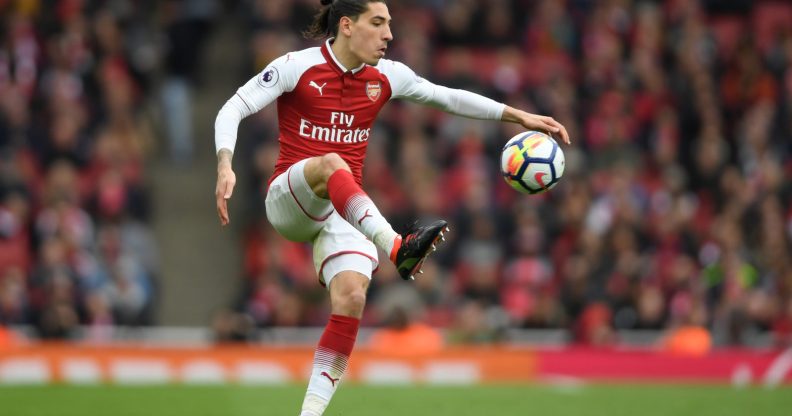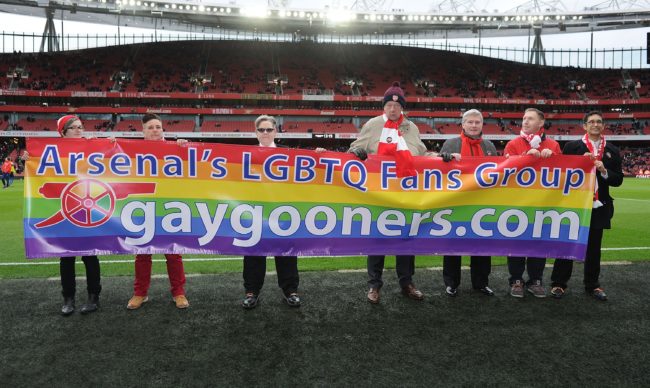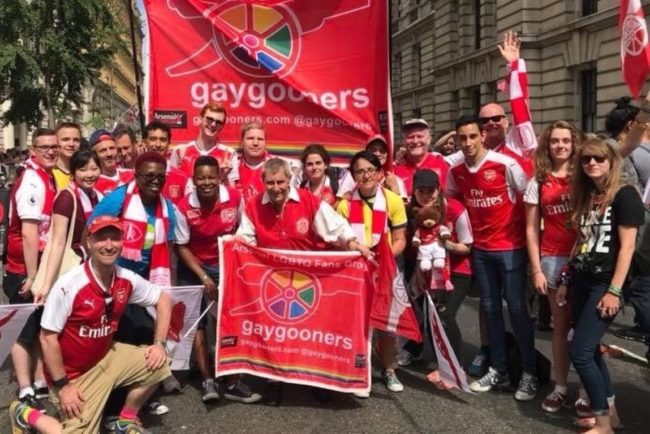Is football ready for an openly gay player? Arsenal’s Héctor Bellerín says no, but fans can change that

Bellerin said men’s football wasn’t ready for a gay player yet (Mike Hewitt/Getty)
Arsenal FC’s right back Héctor Bellerín recently said that football is “not ready” for an openly gay player. But, writing for PinkNews, Dave Raval, chair of Arsenal’s GayGooners—the UK’s first LGBT+ supporters club—says it’s up to fans to change that.
I was sorry to hear about the horrific homophobic abuse received by Arsenal right back Héctor Bellerín. In an interview with The Times, the defender discussed anti-gay insults he’s received—including being called a “lesbian” for growing his hair long–which he said happens mostly online, but also comes from spectators when he’s playing. In fact, the star went as far as to say that football is “not ready” for an openly gay player.
It’s well known that football has a problem with discrimination, whether that be on the basis of sexuality or gender. There are no out male elite players (although there are plenty of openly lesbian top footballers).
People always ask when a player is going to come out. But a better question is: “When are the fans going to come out?” You can’t expect a player to do so if they are the first person to out themselves in a whole stadium.
But things are getting better.

Dave Raval (far right) with other members of GayGooners, and Arsenal legend Pat Rice. (Stuart MacFarlane/Getty)
When we formed the GayGooners—Arsenal’s official LGBT+ Supporters Club—in 2013, we were the first such group to do so, and had just a dozen members. Now we have more than 700. And, I’m pleased to say that around half of the professional clubs in England now have LGBT+ fan groups, providing a mix of social events and campaigning.
The leagues and clubs have played a role, whether that be through supporting LGBT History Month and the Football v Homophobia month of action every February, players wearing rainbow laces, grounds displaying the banners of their LGBT+ fan groups, flying the rainbow flag from stadia or on corner flags around the pitch, or the FA lighting up the Wembley arch in rainbow colours. All the football laws and ground grading rules now treat homophobia and transphobia in the same way as racism.
But what still needs to change are hearts and minds. This is already happening, but takes time.
As Bellerín says, a lot of the abuse is online. This is true. People all over the world can use social media to push bigotry.
When we first started GayGooners, the abuse was terrible. But nowadays when Arsenal tweets about us, lots and lots of straight allies pitch in to the debate, saying how proud they are that our club supports LGBT+ fans.
The problem certainly hasn’t gone away, but far more people are prepared to call it out and to shame the homophobes.

GayGooners at Pride in London in 2017. (GayGooners)
In stadiums, there is no excuse for discrimination—against players or fans—and there are concrete steps clubs can make to help prevent this from happening. At Arsenal’s home matches, stewards are trained to look out for homophobia—and we’e working with them to raise awareness of transphobia, too. Fans are encouraged to report abuse that they hear via their phones, and stadium management will use CCTV to review any incidents and eject transgressors.
The UK is one of the countries that has taken a lead on homophobia in football, but there is clearly still a way to go. However, the work of anti-racism campaigners in football shows that it can be done. It’s down to all of us to get involved.
If you’re an Arsenal fan, or want to get into football for the first time, you can join GayGooners. Or, if you support another club, you can find them at Pride in Football’s website. If your club doesn’t have an LGBT+ fan group yet, form one! Let us know, and we can support you in that process.
Together, we can normalise the presence of LGBT+ fans in football. We’re people, we’re football fans, we exist, and there are lots of us.
With more and more LGBT+ fans publicly entering football, hearts and minds will change, and abuse will diminish.
Once it’s been tackled in the stadiums and online, the sport will be a whole lot better for fans and players alike.

